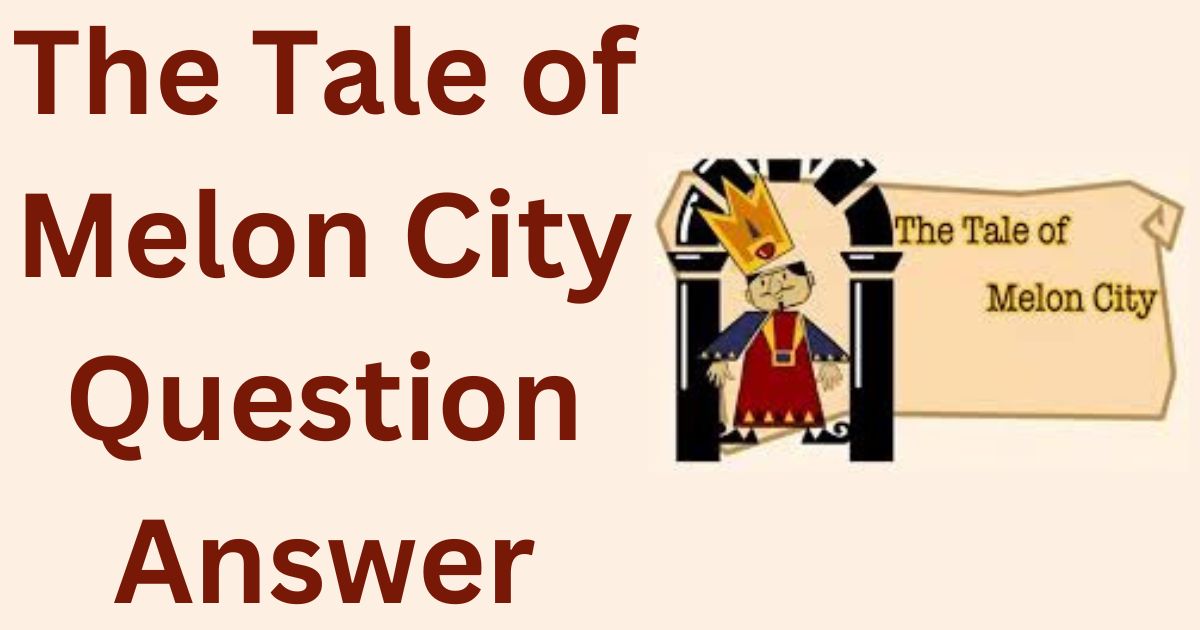Introduction to The Tale of Melon City Question Answer
“The Tale of Melon City” is a satirical poem by Vikram Seth that highlights the absurdity of governance and the irony of justice. The poem portrays a city where decisions are made based on old customs rather than logic or reason. This blog post provides a detailed “The Tale of Melon City Question Answer” guide to help students and literature enthusiasts understand the poem deeply.
Summary of The Tale of Melon City
Before diving into “The Tale of Melon City Question Answer,” let’s summarize the poem. The story revolves around a city where justice is taken to extreme absurdity. The king, known for his commitment to justice, orders the execution of people based on bizarre and illogical reasoning. Eventually, the king himself is hanged due to his decree. As per the custom, the next ruler is chosen by the first person to pass by. That person, a simpleton, declares that the city should be ruled by a melon, and thus, a melon becomes the ruler.
Important Themes in The Tale of Melon City
- Absurdity in Governance – The poem satirizes how rulers and officials make illogical decisions.
- Satire on Justice System – The justice system in the city follows rules blindly, leading to ironic consequences.
- Irony and Humor – The poem uses irony to highlight the flaws in governance.
- Symbolism of the Melon – The melon symbolizes passive governance where the ruler’s presence is irrelevant to the people.
The Tale of Melon City Question Answer – Important Questions
1. What is the significance of the title “The Tale of Melon City”?
Answer: The title “The Tale of Melon City” is significant as it symbolizes a governance system that lacks logic. The poem describes how a city ends up being ruled by a melon due to absurd decision-making customs.
2. Why was the king executed in “The Tale of Melon City”?
Answer: The king ordered the execution of someone responsible for the faulty construction of an arch. However, after a series of bizarre accusations, he himself was found guilty. Since the king had committed to justice, he accepted his execution.
3. How was the new ruler chosen in “The Tale of Melon City”?
Answer: The city followed a custom where the first person to pass by was asked to choose the next ruler. The person, a fool, declared that a melon should be the ruler, and so a melon was crowned as the king.
4. What message does Vikram Seth convey through “The Tale of Melon City”?
Answer: The poem conveys a satirical message about how governance can sometimes be illogical. It highlights the importance of rational decision-making in leadership.
5. How do the citizens react to having a melon as their king?
Answer: The citizens are indifferent to having a melon as their king. As long as they are left undisturbed, they do not care about who rules them.
6. What literary devices are used in “The Tale of Melon City”?
Answer: The poem uses satire, irony, and symbolism to critique governance and blind justice.
The Tale of Melon City Question Answer – Short Answer Questions
Q1: What kind of king was in The Tale of Melon City?
Answer: The king was committed to justice but lacked logical reasoning.
Q2: What role did the arch play in the story?
Answer: The arch was considered guilty for the faulty construction, showcasing the absurdity of justice.
Q3: How does Vikram Seth use irony in “The Tale of Melon City”?
Answer: Irony is present in the way justice is served and how a melon becomes the king.
Q4: What does the poem reveal about the citizens?
Answer: The citizens prefer peace and stability over active governance.
The Tale of Melon City Question Answer – Analytical Questions
Q1: How does “The Tale of Melon City” critique monarchy and democracy?
Answer: The poem criticizes both monarchy and democracy by showing how illogical customs can lead to absurd leadership choices.
Q2: How does the king’s execution reflect the flaws in the justice system?
Answer: The king’s execution shows how blind adherence to justice can lead to irrational outcomes.
Q3: How does the melon symbolize passive governance?
Answer: The melon symbolizes a ruler who does not interfere, and yet the people remain content.
Conclusion
“The Tale of Melon City Question Answer” guide provides a detailed understanding of the poem’s themes, irony, and message. This satirical work by Vikram Seth serves as a humorous yet thought-provoking commentary on governance. Understanding these questions and answers will help students grasp the deeper meanings within the poem.




